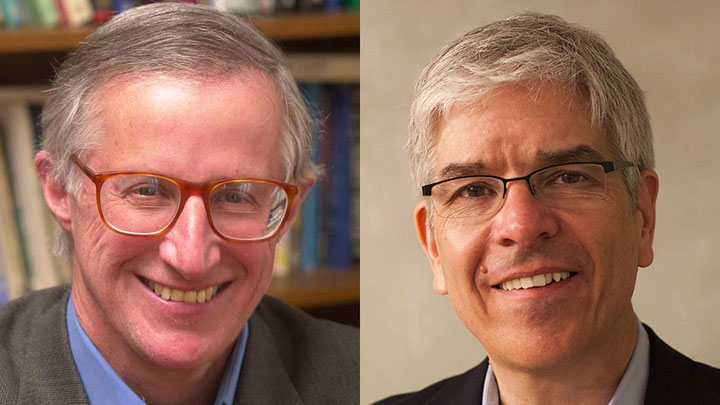You are never too old to be a genius
The Nobel season is always exciting and humble for economists. It was great to see the great research honored. However, it is quite sad when it is also a reminder of how you have wasted youth.
Why do you say that? Because prizes are not usually given to people in their 50-60 years, it is for studies that last for decades. You will know if you are a candidate at the age of 35, because if fate has determined you are a great person, chances are you have finished your research now.
In many areas of knowledge, art, physics, mathematics, there exists a perception that your working capacity is best expressed when you are young. Issac Newton and Albert Einstein did their great work in their 20s, as did Richard Feynman. Or even take one of the award winners last week, Paul Romer, who published the first major report on growth at age 30, based on the research he did as a student. high school student

William Nordhaus (77 years old) and Paul Romer (62 years old) have won this year's Nobel Prize in Economics.
There are several scientific theories that support this.Intellectual intelligence - quick thinking and memorizing information - is said to reach the highest level in the 20s and slowly decline . But intelligence crystallizes, the accumulation of events and knowledge improves with age. As we get older, we are not as agile as before, but we are wiser. Perhaps we need that sharp thinking to find and carry out great research and creativity. Or perhaps too much wisdom has held us back for innovation and yearning to test something new.
More recent research from graduate students at Harvard University shows that it is not so simple. Some kinds of sharp intelligence arise early. The raw processing speed, ie, how quickly we perform the thinking task, peaked at about 18 or 19, but we do not master the other possibilities (such as the emotional state of reading skills). contact) until we reach the age of 40 or 50. As we get older, we combine acumen intelligence with wisdom based on our growing experience. As a result, we are not the smartest ourselves at any age; We excel in different areas at different times in our lives. Researchers estimate that we are best at face recognition skills before the age of 20. But many other tasks relate to thinking and understanding that peaks in middle age. It shows that you are good at solving arithmetic and cognitive problems in your 40s and 50s.
So why do middle-aged researchers not publish breakthrough research? It may be a motivation. There is pressure in the academy to publish major reports before the age of 40 to keep up with the term. Young people also have more time and energy to focus on research, tend to isolate and fully comprehend, before starting family pressure and academy management responsibilities. As Romer grew older, he continued to publish, but diversified his work. He put his research ideas into action to promote economic development and poverty reduction. He assumed leadership roles in his policy. Perhaps he still has many ideas for winning more Nobel prizes, but he seems to want to do more practical applications and take on many different challenges.

Many intellectuals do their best after age 50. Benjamin Franklin is an inventor when he is old. Physicist John Wheeler, who coined the term "black hole" , developed influential theories when he was in his 70s. And we can see many more wonderful studies from older scientists. Future. We have more knowledge and tools than ever before, which means it takes more time to reach the research margin, let alone push it higher. Leonard Susskind, the theoretical physicist of "String Theory" once said: "Physics has been dominated by the minds of young people, but it will not be long, because the older generation is leading the way." .
In a 2006 paper analyzing the ages of Nobel laureates, economists Bruce Weinberg and David Galenson suggested that the most important breakthrough ideas came from the minds of young people, but achievements. The best that requires testing must be later on, when the accumulation of knowledge begins to " return results" . They wrote: "The difference in the impact of experience on two different types of creators can explain why some of the greatest creative scholars in the very early stages of their careers and those another is later ".
Perhaps our most creative days are still ahead. Or perhaps we still have potential, just that we don't use it to do great things.
- History of genius concept
- The truth about the connection between genius and autism
- How is genius different from ordinary people?
- Life is full of events and the mysterious disappearance of a physical genius
- How do the thinking geniuses differ from ordinary people? (Part 2)
- The results of the study of 5,000 genius children within 45 years have been announced
- Mystery numbers can 'open up the universe' of the scientist 'crazy' genius
- Genius must ... have disabilities?
- Strange habits of Albert Einstein's genius and lessons hidden later
- The legend of the God of Fortune
- How does the brains of geniuses work? (2)
- Becoming a mathematical genius is due to birth
 The most famous scientific failures in history
The most famous scientific failures in history Mysterious genius mechanic and the machine froze time
Mysterious genius mechanic and the machine froze time The son carries the 'bad gene' of genius Albert Einstein
The son carries the 'bad gene' of genius Albert Einstein Isaac Newton
Isaac Newton